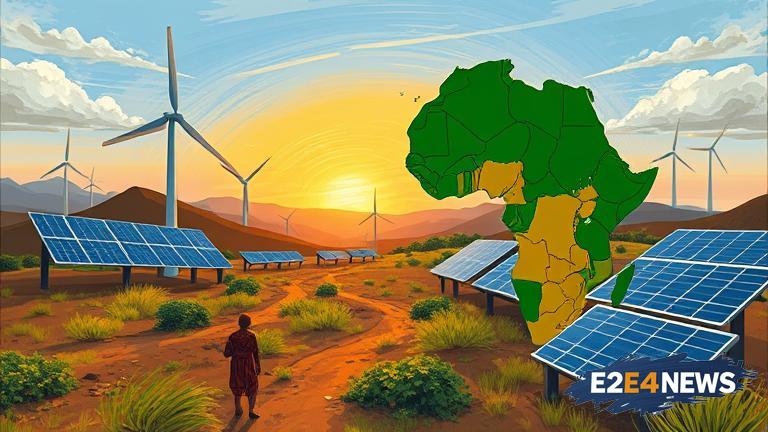The African continent is witnessing a significant shift towards renewable energy, driven by the need to address the pressing issues of energy access, energy security, and climate change. With a growing population and increasing economic activities, the demand for energy is on the rise, and renewable energy sources such as solar, wind, and hydroelectric power are becoming increasingly attractive. Many African countries are now investing heavily in renewable energy infrastructure, with a focus on solar and wind power. For instance, South Africa has set a target of generating 42% of its electricity from renewable sources by 2030, while Morocco aims to generate 52% of its electricity from renewables by 2030. Egypt, on the other hand, has launched an ambitious plan to generate 20% of its electricity from renewable sources by 2022. The use of renewable energy is not only helping to reduce greenhouse gas emissions but also creating new job opportunities and stimulating local economies. In addition, renewable energy is becoming increasingly cost-competitive with fossil fuels, making it a more viable option for many African countries. The African Union has also launched the Africa Renewable Energy Initiative, which aims to achieve at least 300 GW of renewable energy capacity by 2030. The initiative has received significant support from international organizations and donors, who are providing financial and technical assistance to help African countries achieve their renewable energy targets. Despite the progress made, there are still significant challenges to be addressed, including the lack of infrastructure, limited access to financing, and the need for policy and regulatory frameworks that support the development of renewable energy. However, with the right policies and investments in place, Africa has the potential to become a global leader in the transition to renewable energy. The benefits of renewable energy are numerous, including reduced air pollution, improved public health, and enhanced energy security. Moreover, renewable energy can help to promote economic development, improve energy access, and reduce poverty. In fact, a study by the International Renewable Energy Agency (IRENA) found that every dollar invested in renewable energy generates up to three times as much economic growth as the same dollar invested in fossil fuels. Furthermore, renewable energy can help to reduce the continent’s reliance on imported fossil fuels, improving trade balances and reducing the vulnerability to price volatility. The growth of renewable energy in Africa is also driven by the increasing demand for energy from industries such as mining, manufacturing, and agriculture. As the continent’s economies continue to grow, the demand for energy is expected to increase, making it essential to invest in renewable energy sources that can meet this demand sustainably. In conclusion, the renewable energy revolution in Africa is gaining momentum, driven by the need to address the pressing issues of energy access, energy security, and climate change. With the right policies and investments in place, Africa has the potential to become a global leader in the transition to renewable energy, promoting economic development, improving energy access, and reducing poverty. The future of energy in Africa is renewable, and it is essential that governments, international organizations, and the private sector work together to support the development of renewable energy infrastructure and promote the use of clean energy sources. The benefits of renewable energy are clear, and it is time for Africa to take the lead in the global transition to a low-carbon economy. By doing so, the continent can reduce its reliance on fossil fuels, promote sustainable development, and improve the lives of its citizens. The time to act is now, and the opportunities for renewable energy in Africa are vast and varied. With the right approach, Africa can become a beacon of hope for a sustainable energy future, and a model for other regions to follow.
